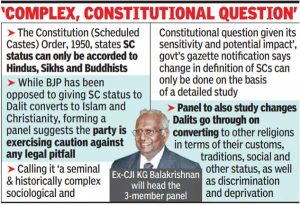10 Oct Government appoints commission to study Scheduled Caste status of Dalits post conversion
Government appoints commission to study Scheduled Caste status of Dalits post-conversion
The article tells how the “Scheduled Caste status of Dalits post-conversion” impacts Indian Polity and Governance.
CONTEXT
The Central Government has constituted a three-member commission of Inquiry headed by ex-CJI Justice K.G. Balakrishnan to examine the issue of extending Scheduled Caste status to Dalits who have converted to religions other than Buddhism or Sikhism. The Commission will submit the report within 2 years.
THE CURRENT STATUS
- As of now, the benefits of reservation are available only to Dalit Hindus, Buddhists, and Sikhs. They are not available to Dalit Muslims or Christians
- There have been demands and various petitions pending before the Supreme Court to extend Scheduled Caste reservation to Dalits who converted to Christianity or Islam.
- The demand for the reservation has been on account of historic injustice in the form of discrimination and untouchability.

Pic: Scheduled Caste Status
CONSTITUTIONAL PROVISIONS
- According to Article 341(1) of the Constitution, The President may concerning any State or Union territory, and where it is a State after consultation with the Governor thereof, by public notification, specify the castes, races, or tribes or parts of or groups within castes, races or tribes which shall for the purpose of this Constitution be deemed to be Scheduled Castes in relation to that State or Union territory, as the case may be.
- According to Article 341(2), Parliament can then by law include in or exclude from the list of Scheduled Castes such communities which have been specified under the Presidential notification under Article 341(1)
PRIOR EFFORTS
- This is not the first time that efforts are being made to bring Dalit Christians and Muslims under the ambit of Scheduled Cates.
- The UPA Government under then Prime Minister Manmohan Singh had set up two important commissions to examine the issue – Ranganath Misra Commission and Rajinder Sachar Commission.
- Ranganath Misra Commission,(2004) recommended giving SC status to Dalits belonging to all religions. It recommended 10% reservation for Muslims and 5% reservation for other minorities in government jobs
- It found the caste system to be “an all-pervading social phenomenon in India shared by almost all Indian communities”. It emphasized the constitutional need to eliminate the religion-based discrimination underlying the present policy of limiting SC status to Hindus, Sikhs, and Buddhists.
- In furtherance of this, it recommended abrogating the Scheduled Caste Order of 1950 which excluded Muslims, Christians, Jains, and Parsis from the purview of SC reservation.
- The report, however, was not implemented on the ground of a lack of sufficient data.
- Rajinder Sachar Commission (2005), was headed by former Chief Justice of Delhi High Court Rajinder Sachar.
- The commission set up an Equal Opportunity Commission to look into grievances of deprived groups like minorities.
- It also recommended creating a nomination procedure to increase the participation of minorities in public bodies
- In addition to these panels, the National Commission for Scheduled Castes and the National Commission for Minorities had also recommended providing SC status to Dalit Muslims and Dalit Christians in affidavits filed before the Supreme Court in 2011.
BALAKRISHNAN COMMISSION (2022)
- While Justice K.G Balakrishnan will chair the commission, other members include Professor Sushma Yadav, UGC, and retired IAS officer Ravinder Kumar Jain.
- The commission will study and submit its recommendation if SC status can be accorded to religions other than Hindus, Sikhs, and Buddhists.
- The Constitution (Scheduled Castes) Order, 1950, originally provided SC reservation only to Hindus. It was amended in 1956 to include Sikh communities. Thereafter, it was amended again in 1990 to include Buddhist communities as SCs.
- The commission will also look into the changes Scheduled Caste persons go through on converting to other religions in terms of their customs, traditions, social and other status
CENTER’s STAND
- The Union government is yet to state its stand on the matter in court.
- However, an affidavit filed by the Union Government in 2019, it had stated that Dalit Buddhists cannot be compared to Dalits who had converted to Christianity or Islam. Giving reasons for it, the government said that this was because in the case of Dalit Buddhists, the conversions were voluntary while in the latter case, it was not so and conversions were on account of other factors.
- It also stated that untouchability is a feature of the Hindu religion and its branches alone, it cannot be given to Dalits who converted to Christianity or Islam, and hence they cannot claim to be backward.
WAY AHEAD
The commission will examine the issue and make then report its recommendations. Only then can a logical step be taken in that direction. If the community indeed faces the discrimination it claims then the policy of reservation should also be extended to them to make India truly inclusive.
SOURCES
1. The Hindu. (Status beyond faith: On SC status post-conversion)
2. The Hindu. (Panel to study SC status of Dalits post-conversion)
Daily Current Affairs for UPSC
Are you looking for the latest current affairs for your UPSC exam preparation? Plutus IAS provides the best current affairs for the UPSC examination. So Current affairs are parts and parcel of any competitive examination. Without reading daily current affairs, none of the UPSC aspirants pass their mains, or prelims examinations. So every UPSC aspirant should read the new and daily current affairs for cracking their IAS exam.



No Comments